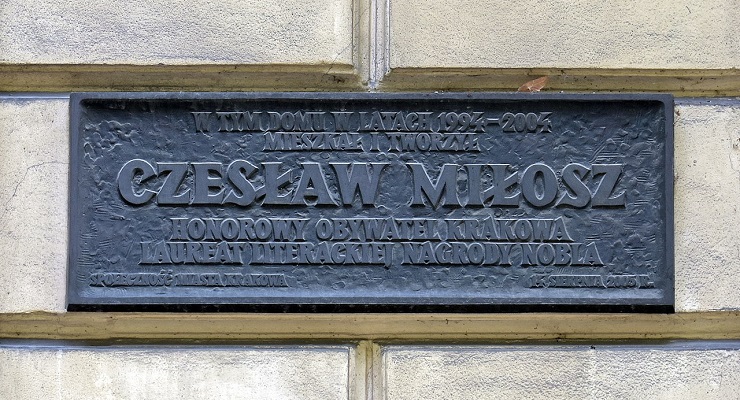
Want to become a signature voice of your troubled nation? Perhaps you need a decades-long exile in California.
It worked for Czesław Miłosz, who entered the pantheon of Polish poets thanks to works he wrote mostly in Berkeley.
The poet’s story—told by humanities scholar Cynthia L. Haven in a surprising and thought-provoking recent book, Czesław Miłosz: A California Life—reminds us how our state allows people to move both further from and closer to home, often at the same time.
Miłosz, while famous in Poland and in poetry circles (Joseph Brodsky called him the greatest poet of our times), is a name unfamiliar to most Californians. But he remains the only affiliate of the University of California system, where he taught Slavic languages and literature, to win a Nobel Prize in the humanities.
“The irony,” writes Haven, “is that the greatest California poet—and certainly one of America’s greatest poets too—could well be a Pole who wrote a single poem in English.”
Born in Lithuania in 1911 to Polish-speaking gentry, Miłosz pursued a literary career in Warsaw. There he witnessed some of the worst bombing and violence of World War II—an experience that was foundational to his work and worldview. He served as a diplomat for Poland’s Stalinist government, before defecting in Paris in 1951. In 1960, he accepted a teaching post at Berkeley.
He would stay for 40 years, living in and writing from a cottage on Grizzly Peak, looking down over the whole Bay Area.
At first, California seemed irrelevant to his work. The state stood apart from history. His students didn’t understand good and evil, or the horrors of even the recent past. He was ambivalent about California, and horrified by a visit to Los Angeles. Even the beautiful landscapes seemed too immense and unforgiving.
“If California is not a separate planet, it is at least a separate colony of planet Earth,” one of Miłosz’s friends recalls him saying, according to Haven.
But it was the 1960s, and history and social turmoil soon arrived in California—and especially in Berkeley. This time, Miłosz engaged with it, and other changes that came through the state, including the arrival of Silicon Valley. He learned California’s history (he seemed particularly interested in the Donner Party).
Bells in Winter, the collection of poems that effectively earned Milosz the Nobel in 1980, was originally supposed to be called Berkeley Poems. In that book, he imagines his spinster sisters (“two parakeets from Samogitia,” a region in Lithuania) visiting him in the desert, amidst the Joshua trees.
Soon, the state seeped into him and his work. His autobiographic Native Realm: A Search for Self-Definition often compares Eastern Europe and the Bay Area. So too did his 1969 poem, “Reading the Japanese Poet Issa (1762-1826),” which moves in just a few lines from the West Coast…
The invisible ocean,
fog until noon
dripping in a heavy rain from the boughs of the redwoods,
sirens droning below on the bay.
to southern Poland:
…whether this is the village of Szlembark
above which we used to find salamanders,
garishly colored like the dresses of Teresa Roszkowska
California, Haven shows, broadened the poet’s perspective, and allowed him to put the horrors of his earlier life in Lithuania and Poland in a global context. His experiences here “transfigured him from a poet writing from one corner of the world to a poet who could speak for all if it, from a poet focused on history to a poet concerned with modernity and who always had his eyes fixed on forever.”
Haven recounts that Bells in Winter, the collection of poems that effectively earned Miłosz the Nobel in 1980, was originally supposed to be called Berkeley Poems. In that book, he imagines his spinster sisters (“two parakeets from Samogitia,” a region in Lithuania) visiting him in the desert, amidst the Joshua trees.
“The majestic expanse of the Pacific Seacoast has imperceptibly worked its way into my dreams, remaking me, stripping me down, and perhaps thereby liberating me,” Miłosz would write.
Top of Form
Miłosz never would have become the great poet of Poland if he hadn’t come to California. If he had stayed in Soviet Poland, he might have been censored or persecuted. Without exile in such a faraway and thought-provoking place, could he have “explored the margins of loneliness, alienation and abandonment?” Haven asks.
Miłosz eventually did go back to Poland, with his second wife, an American university administrator. He died in Krakow in 2004.
His work remains relevant today, in a time of catastrophes, political and environmental. Haven suggests that Californians in particular have much to learn from Miłosz, through his “twinning of vision and historical consciousness.”
In Bells in Winter, Miłosz wrote:
For me, therefore, everything has a double existence
Both in time and when time shall be no more.
Miłosz was both European and Californian. He was both a man of the past and the future. Like so many Californians, he struggled with the dualities of place and identity and home.
In his one English poem, “To Raja Rao,” Miłosz wrote:
For years I could not accept
the place I was in.
I felt I should be somewhere else….
I learned at last to say: this is my home
Here
Before the glowing coal of ocean sunsets
On the shore which faces the shores of your Asia,
In a great republic, moderately corrupt
This article appears in Zócalo Public Square.
Leave a Reply